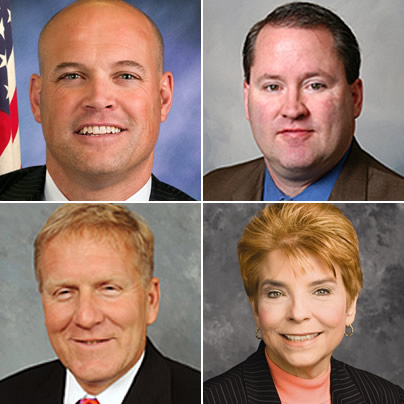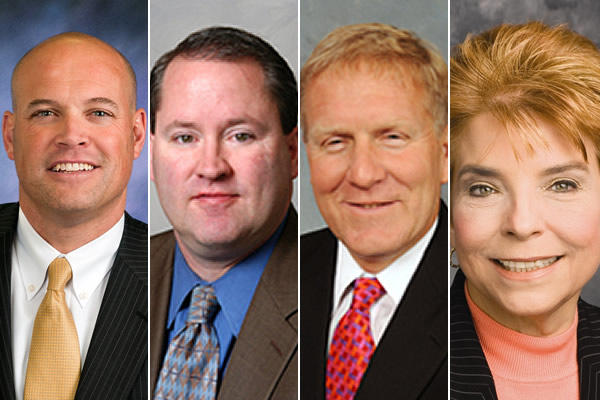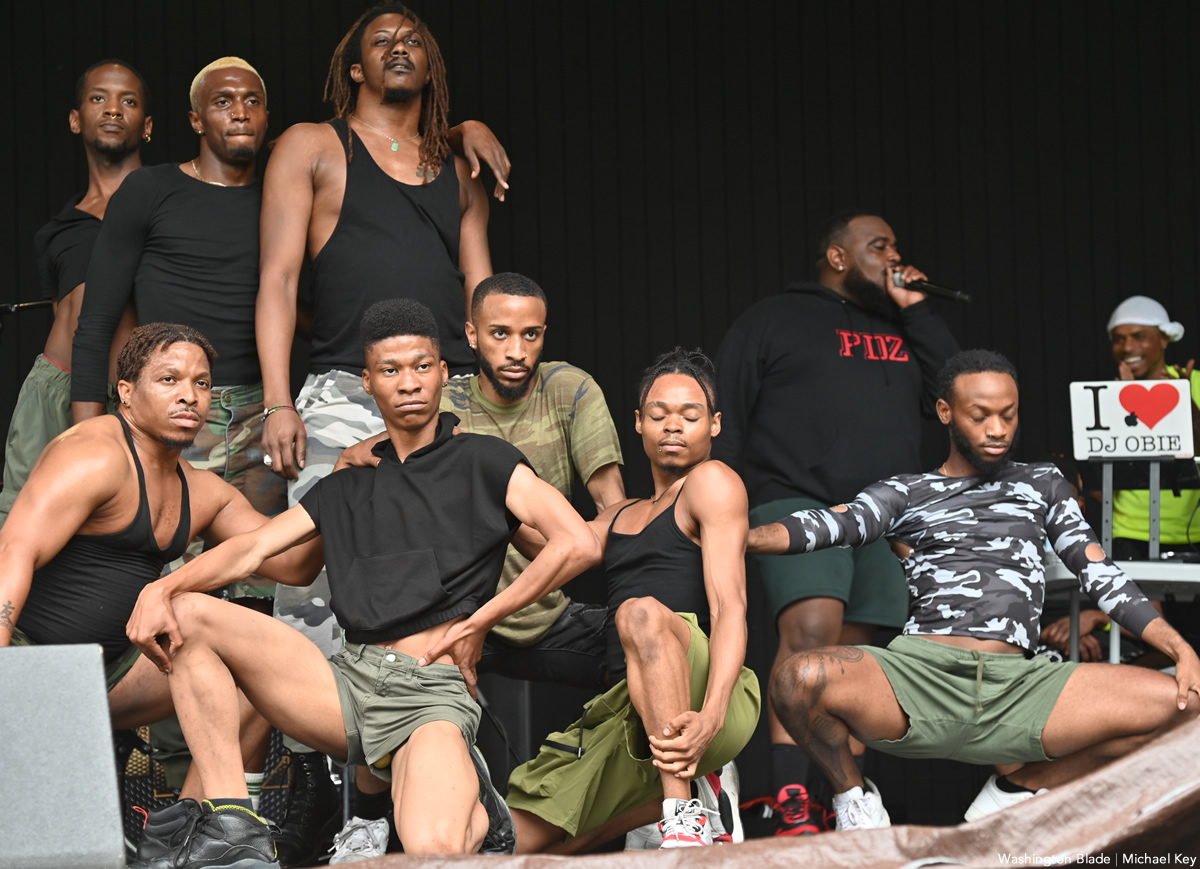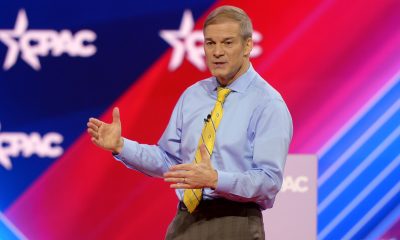News
Ill. Republicans who backed gay nuptials triumph in primaries
LGBT advocates say success demonstrates ‘turning point’ in the GOP


From left, Ill. state Representatives Ron Sandack (R-Bolingbrook), Ed Sullivan, Jr. (R-Libertyville), Tom Cross (R-Plainfield) and Ill. state Comptroller Judy Baar Topinka each won their Republican primaries. (Photos public domain)
Republican officials in Illinois who supported marriage equality won their primaries across the board this week — a development that LGBT rights supporters say demonstrates growing support for marriage equality even within the Republican Party.
Jeff Cook-McCormac, senior adviser to the pro-LGBT American Unity Fund, counted four victories on Tuesday night among Republicans who supported marriage equality and said they represent a “turning point” for the party.
“These victories in Illinois demonstrate that we really are reaching a turning point, not only on the issue nationally, but we’re reaching a turning point within the Republican Party,” Cook-McCormac said. “It’s becoming safer and safer for Republican elected officials to follow their conscience, do the right thing and advance the freedom to marry.”
Each of the three Republicans who voted for marriage equality when it came before the Illinois State House in November — State Reps. Tom Cross, Ed Sullivan and Ron Sandack — faced primary challengers, but came out on top to keep their party’s nomination going into the general election.
Cross and Sullivan beat their competitors by double-digit points in the primary. Sandack scored a narrower win, defeating his opponent by 153 votes.
Additionally, Illinois State Comptroller Judy Baar Topinka, who voiced support for marriage equality, didn’t face a primary challenge. She spoke at rallies in favor of marriage equality, including the ceremony in which Gov. Pat Quinn signed the marriage legislation into law.
Pat Brady, former head of the Illinois Republican Party who helped lobby for the marriage equality legislation for the American Civil Liberties Union of Illinois, said the result “puts the issue to rest” over whether Republicans can be politically viable if they support same-sex marriage.
“The people that so loudly proclaimed that they were going to take out anybody in the Republican primary — or Democratic primary, for that matter — that voted for marriage equality turned out to be just what I thought they’d be: a bunch of paper tigers,” Brady said.
Brady, who resigned his position as party chair shortly after he announced his personal support for marriage equality, said the election results demonstrate a shift in the “political reality” of the Republican Party.
“It is a shift,” Brady said. “You can be pro-marriage equality, still be a good Republican and still win. And in a state like Illinois, to win the general election, I think it helps candidates.”
The results of the primary reflect the growing support for marriage equality nationwide — even within the Republican Party. A Washington Post/ABC News poll published earlier this month found record support for same-sex marriage and 40 percent of Republicans favor gay nuptials.
Support is particularly strong among young Republicans. A Pew Research Center poll published March 10 found 61 percent of Republicans under age 30 support same-sex marriage.
But one anti-gay group that worked to oppose the legalization of same-sex marriage in Illinois is disputing the notion the wins for Republican who voted for it represents change.
David Smith, executive director of the Illinois Family Institute, said the results are “absolutely not” a shift and instead the result of Republicans enlisting the help of Democrats to win primaries.
“It’s a very well-established fact that a lot of Democrats crossed over to vote in the Republican primary because there wasn’t a significant race for governor and for Senate on the Democratic ballot,” Smith said. “There was a quite a lot of union-plus-Democrat crossover.”
Smith also denied that wins for Republicans who voted for same-sex marriage had any wider implication of growing support for same-sex marriage within the GOP.
“I would point to the fact that the two social conservatives running for governor in a Republican primary got 59 percent of the vote together, allowing a more moderate Republican to win,” Smith said. “Obviously, social issues do matter to the majority — 60 percent or more — of Republican voters.”
But Cook-McCormac pushed back against the assertion that wins for Republicans who voted for marriage equality has no meaning, saying anti-gay groups are “running out of excuses.”
“They can create whatever excuses and draw whatever explanations that they like,” Cook-McCormac said. “The bottom line is they were out campaigned, out worked and they were out-appealed-to. Americans, and Republican voters in particular, are done with the anti-gay politics of the past and they’re ready to move forward based on the issues that unite all of us.”
The two sides nonetheless agree that marriage equality was the major issue for why these Republicans faced primary challenges. For Sandack, the candidate who came the closest to losing, anti-gay groups circulated a flier and aired TV ads displaying two men kissing (much to the consternation of Windy City Times, which has accused the groups of unlawfully stealing a photo of Sandack taken by the gay newspaper for the material).
The wins arguably represent a change from what happened with Republicans in New York who voted to legalize same-sex marriage in 2011. According to The New York Times, one faced a difficult re-election and decided not to run again, another was defeated in a primary, and the other was defeated by a Democrat in the general election because a conservative in the race drew away votes.
“It’s demonstrated that our side has got a lot better at defending our kind,” Cook-McCormac said. “As we’ve seen in Illinois, there are very smart, sophisticated strategies being put in place independently in addition to bundling direct contributions to candidates that are helping to ensure that these legislators who show courage are well-positioned to win re-election.”
The pro-gay Illinois Unity PAC raised $155,000 to assist with independent expenditure efforts on behalf of Ed Sullivan and Ron Sandack, which primarily focused on public opinion research, multiple rounds of direct mail, live operator ID and get-out-the-vote calls, a source familiar with the PAC said. On the other side, the main anti-gay independent expenditure committee, Liberty Principles PAC, spent about $220,000 just attacking Sandack, the source said.
But the wins for pro-gay Republican weren’t across the board. In a bid for the Republican nomination to represent the state’s 9th congressional district in the U.S. House, Susanne Atanus, who has blamed tornadoes and autism on gay rights and abortion, beat out her more moderate competitor, David Earl Williams III, even though the state party called on her to drop out of the race.
“God is angry. We are provoking him with abortions and same-sex marriage and civil unions,” she said during a debate. “Same-sex activity is going to increase AIDS. If it’s in our military it will weaken our military. We need to respect God.”
Cook-McCormac downplayed the significance of Atanus’ win, saying she has “zero chance” in her bid against Rep. Jan Schakowsky in the heavily Democratic district.
“It’s always embarrassing whether it’s Democrats putting up far-left candidates or Republicans putting up far-right to see those people on the ballot,” Cook-McCormac said. “But I hardly believe a candidate like that is really representative of where Republicans are.”
Wins for Illinois Republicans who supported same-sex marriage raises the question of viability in the other two states that legalized same-sex marriage through the legislative process in 2013: Minnesota and Hawaii. Both of the primaries in those states will take place in August.
State Rep. Cynthia Thielen in Hawaii is facing the threat of a primary challenger on Aug. 9, while State Rep. Jenifer Loon in Minnesota is facing the threat of a primary challenger on Aug. 12. The challengers to these lawmakers, who have no political experience, are running single-issue campaigns against the marriage equality votes.
Cook-McCormac spoke generally about the progress made on LGBT issues in the GOP when asked whether the Illinois primary results will predict the outcome of Republican primaries in Hawaii and Minnesota.
“I think that what you’re going to see is that other Republican candidates across the country who are being challenged by an increasingly small group of opponents on this issue, they’re going to have the resources they need to win, as well as the broad-based political support of Republicans who may have a diversity of opinions on the marriage issue, but who recognize that these public servants’ focus on lower taxes, smaller government, and creating more jobs is why they chose them to represent them in the first place,” Cook-McCormac said.
District of Columbia
Reenactment of first gay rights picket at White House draws interest of tourists
LGBTQ activists carry signs from historic 1965 protest

About 30 LGBTQ activists formed a circular picket line in front of the White House Wednesday afternoon, April 17, carrying signs calling for an end to discrimination against “homosexuals” in a reenactment of the first gay rights protest at the White House that took place 59 years earlier on April 17, 1965.
Crowds of tourists looked on with interest as the activists walked back and forth in silence in front of the White House fence on Pennsylvania Avenue. Like the 1965 event, several of the men were dressed in suits and ties and the women in dresses in keeping with a 1960s era dress code policy for protests of the Mattachine Society of Washington, D.C., the city’s first gay rights group that organized the 1965 event.
Wednesday’s reenactment was organized by D.C.’s Rainbow History Project, which made it clear that the event was not intended as a protest against President Joe Biden and his administration, which the group praised as a strong supporter of LGBTQ rights.
“I think this was an amazing event,” said Vincent Slatt, the Rainbow History Project official who led efforts to put on the event. “We had twice as many that we had hoped for that came today,” he said.
“It was so great to see a reenactment and so great to see how far we’ve come,” Slatt said. “And also, the acknowledgement of what else we still need to do.”
Slatt said participants in the event who were not carrying picket signs handed out literature explaining the purpose of the event.
A flier handed out by participants noted that among the demands of the protesters at the 1965 event were to end the ban on homosexuals from working in the federal government, an end to the ban on gays serving in the military, an end to the denial of security clearances for gays, and an end of the government’s refusal to meet with the LGBTQ community.
“The other thing that I think is really, really moving is some of the gay staff inside the White House found out this was happening and came out to greet us,” Slatt said. He noted that this highlighted how much has changed since 1965, when then President Lyndon Johnson’s White House refused to respond to a letter sent to Johnson from the Mattachine Society explaining its grievances.
“So now to have gay people in the White House coming out to give us their respects and to say hello was especially meaningful to us,” Slatt said. “That was not expected today.”
Among those walking the picket line was longtime D.C. LGBTQ rights advocate Paul Kuntzler, who is the only known surviving person who was among the White House picketers at the April 1965 event. Kuntzler said he proudly carried a newly printed version of the sign at Wednesday’s reenactment event that he carried during the 1965 protest. It stated, “Fifteen Million Homosexuals Protest Federal Treatment.”
Also participating in the event was Japer Bowles, director of D.C. Mayor Muriel Bowser’s Office of LGBTQ Affairs. Bowles presented Slatt with a proclamation issued by Bowser declaring April 17, 2024, Mattachine Society Day in Washington, D.C.
“Whereas, on April 17, 1965, the Mattachine Society of Washington courageously held the nation’s inaugural picket for gay rights, a seminal moment in the ongoing struggle for LGBTQIA+ equality in the United States, marking the genesis of public demonstrations advocating for those rights and paving the way for Pride Marches and Pride celebrations worldwide,” the proclamation states.
About 30 minutes after the reenactment event began, uniformed Secret Service agents informed Slatt that due to a security issue the picketers would have to move off the sidewalk in front of the White House and resume the picketing across the street on the sidewalk in front of Lafayette Park. When asked by the Washington Blade what the security issue was about, one of the Secret Service officers said he did not have any further details other than that his superiors informed him that the White House sidewalk would have to be temporarily cleared of all people.
Participants in the event quickly resumed their picket line on the sidewalk in front of Lafayette Park for another 30 minutes or so in keeping with the 1965 picketing event, which lasted for one hour, from 4:20 p.m. to 5:20 p.m., according to Rainbow History Project’s research into the 1965 event.
Although the LGBTQ picketers continued their procession in silence, a separate protest in Lafayette Park a short distance from the LGBTQ picketers included speakers shouting through amplified speakers. The protest was against the government of Saudi Arabia and organized by a Muslim group called Al Baqee Organization.
A statement released by the Rainbow History Project says the reenactment event, among other things, was a tribute to D.C.-area lesbian rights advocate Lilli Vincenz, who participated in the 1965 White House picketing, and D.C. gay rights pioneer Frank Kameny, who founded the Mattachine Society of Washington in the early 1960s and was the lead organizer of the 1965 White House protest. Kameny died in 2011 and Vincenz died in 2023.
The picket signs carried by participants in the reenactment event, which were reproduced from the 1965 event, had these messages:
• “DISCRIMINATION Against Homosexuals is as immoral as Discrimination Against Negroes and Jews;”
• “Government Should Combat Prejudice NOT PROMOTE IT”
• “White House Refuses Replies to Our Letters, AFRAID OF US?
• “HOMOSEXUALS Died for their Country, Too”
• “First Class Citizenship for HOMOSEXUALS”
• “Sexual Preference is Irrelevant to Employment”
District of Columbia
Organizers announce details for D.C. Black Pride 2024
Most events to take place Memorial Day weekend at Westin Downtown

The Center for Black Equity, the organizer of D.C. Black Pride, the nation’s first and one of the largest annual African-American LGBTQ Pride celebrations, announced this year’s event will take place Memorial Day Weekend from May 24-27.
The announcement, released April 16, says that most 2024 D.C. Black Pride events will take place at the Westin Washington, D.C. Downtown Hotel at 999 9th St, N.W.
“With the theme Black Pride Forever, the event promises a weekend filled with vibrant celebrations, empowering workshops, and a deep exploration of Black LGBTQIA+ history and culture,” the announcement says.
It says events will include as in past years a “Rainbow Row” vendor expo at the hotel featuring “organizations and vendors created for and by the LGBTQIA+ community” offering products and services “that celebrate Black excellence.”
According to the announcement, other events include a Health and Wellness Festival that will offer workshops, demonstrations, and activities focused on “holistic well-being;” a Mary Bowman Poetry Slam “showcasing the power and beauty of spoken word by Black LGBTQIA+ artists;” the Black Pride Through the Decades Party, that will celebrate the “rich history of the Black LGBTQIA+ movement;” and an Empowerment Through Knowledge series of workshops that “delve into various topics relevant to the Black LGBTQIA+ community.”
Also, as in past years, this year’s D.C. Black Pride will feature its “Opening Night Extravaganza” reception and party that will include entertainment and live performances.
The announcement notes that D.C.’s annual Black Pride celebration, started in 1991 as a one-day outdoor event at Howard University’s Banneker Field, has inspired annual Black LGBTQ Pride events across the United States and in Canada, United Kingdom, Brazil, Africa, and the Caribbean. More than 300,000 people attend Black LGBTQ Pride events each year worldwide, the announcement says.
Full details, including the official schedule of events, can be accessed at dcblackpride.org.
Indiana
Drag queen announces run for mayor of Ind. city
Branden Blaettne seeking Fort Wayne’s top office

In a Facebook post Tuesday, a local drag personality announced he was running for the office of mayor once held by the late Fort Wayne Mayor Tom Henry, who died last month just a few months into his fifth term.
Henry was recently diagnosed with late-stage stomach cancer and experienced an emergency that landed him in hospice care. He died shortly after.
WPTA, a local television station, reported that Fort Wayne resident Branden Blaettne, whose drag name is Della Licious, confirmed he filed paperwork to be one of the candidates seeking to finish out the fifth term of the late mayor.
Blaettner, who is a community organizer, told WPTA he doesn’t want to “get Fort Wayne back on track,” but rather keep the momentum started by Henry going while giving a platform to the disenfranchised groups in the community. Blaettner said he doesn’t think his local fame as a drag queen will hold him back.
“It’s easy to have a platform when you wear platform heels,” Blaettner told WPTA. “The status quo has left a lot of people out in the cold — both figuratively and literally,” Blaettner added.

The Indiana Capital Chronicle reported that state Rep. Phil GiaQuinta, who has led the Indiana House Democratic caucus since 2018, has added his name to a growing list of Fort Wayne politicos who want to be the city’s next mayor. A caucus of precinct committee persons will choose the new mayor.
According to the Fort Wayne Journal Gazette, the deadline for residents to file candidacy was 10:30 a.m. on Wednesday. A town hall with the candidates is scheduled for 6 p.m. on Thursday at Franklin School Park. The caucus is set for 10:30 a.m. on April 20 at the Lincoln Financial Event Center at Parkview Field.
At least six candidates so far have announced they will run in the caucus. They include Branden Blaettne, GiaQuinta, City Councilwoman Michelle Chambers, City Councilwoman Sharon Tucker, former city- and county-council candidate Palermo Galindo, and 2023 Democratic primary mayoral candidate Jorge Fernandez.




















